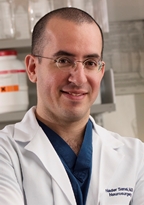
Called “Phase 0 Trials,” these early-phase clinical trials shorten the evaluation of drug therapies from an average of five years to only six months at a fraction of the cost. During each single-patient trial, participants are administered an experimental drug already proven to be safe in other types of cancer. Within hours, Barrow neurosurgeons remove the brain tumor and within weeks it is determined if the experimental drug penetrated the tumor and whether it is having a positive effect on the tumor. If the drug reaches the tumor and shows activity, it moves into a Phase 2 clinical trial for patients. If it does not prove to be effective, the patient has the option to enter another study.
“Brain tumors are among the deadliest of all cancers and during the last 30 years, little progress has been made on successful treatments to increase life expectancy,” says Nader Sanai, MD, Director of the Barrow Brain Tumor Research Center. “This Phase 0 approach for malignant brain tumors is a game changer in cancer research and our program is the first of its kind in the world.”
These studies are called Phase 0 clinical trials because they occur outside of the three lengthy phases that evaluate a drug’s safety, effectiveness, side effects and dosage. After years of research and millions of dollars, the vast majority of experimental drugs for brain tumors proves ineffectual and is never brought to market.
One of the major difficulties in treating brain tumors is finding drugs that can penetrate the blood-brain barrier, which buffers the brain from the rest of the body’s blood-circulatory system. Located along capillaries, the blood-brain barrier protects the brain from rapid changes in the body’s metabolic conditions and minimizes exposure to molecules that are toxic to neurons in the brain.
“The main question answered by these Phase 0 clinical trials is this: Does the drug get to the tumor?” said Dr. Michael Berens, PhD, TGen Deputy Director for Research Resources. “Next, we look at how much of the drug is enough, and if there are any signs of patient benefit.”
TGen is using its world-class expertise in genomic sequencing to analyze brain tumor samples and help determine which drugs might work best.
“Because of what is known about how each drug works, we think there are certain genetic mutations that would make certain patients more responsive to the drug,” said Dr. Berens, who also is Director of TGen’s Cancer and Cell Biology Division and TGen’s Glioma Research Lab.
Karmanos is analyzing samples of the resected brain tumors, following surgery, to determine how much of the drug accumulated in the tumor, and what effect, if any, the drugs have on the cancer.
Phase 0 trials were recently introduced by the FDA and have never before been widely used for brain tumor patients. This is the first non-governmental study coalition to push forward with these trials, an initiative that has drawn interest from some of the world’s largest cancer therapy developers. The first of these Phase 0 clinical trials was made possible largely through a generous grant by The Ben & Catherine Ivy Foundation.
“The absence of truly effective drugs for brain tumors is one of the medical community’s most critical unmet needs,” says Catherine Ivy, President of The Ben & Catherine Ivy Foundation. “These Phase 0 clinical trials are part of a much larger research strategy funded by the Ivy Foundation to address this need and give new hope to brain tumor patients worldwide.”
Dr. Sanai believes the trials will provide encouragement to brain tumor patients, who often feel abandoned.
“Because of the high cost of developing and testing drugs, there is very little in the pharmaceutical pipeline that has reached brain tumor patients,” says Dr. Sanai. “It has just been too expensive for drug companies to develop new therapies for the relatively small number of brain cancer patients. These Phase 0 trials can be the answer. They are safe, cost effective and quick to give us an answer. If a new drug dosen’t work, we move to the next one without the patient losing any time. For the first time, I can tell every brain tumor patient, ‘I have something new for you’.”


